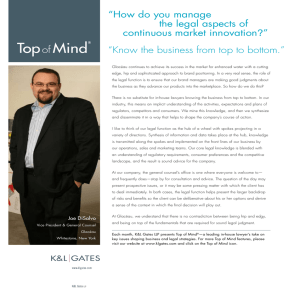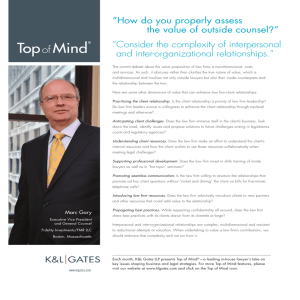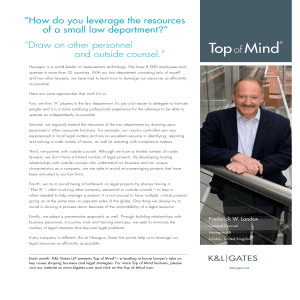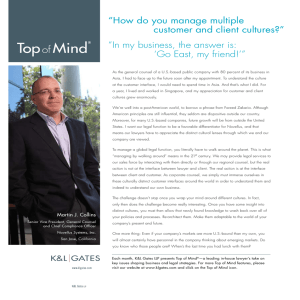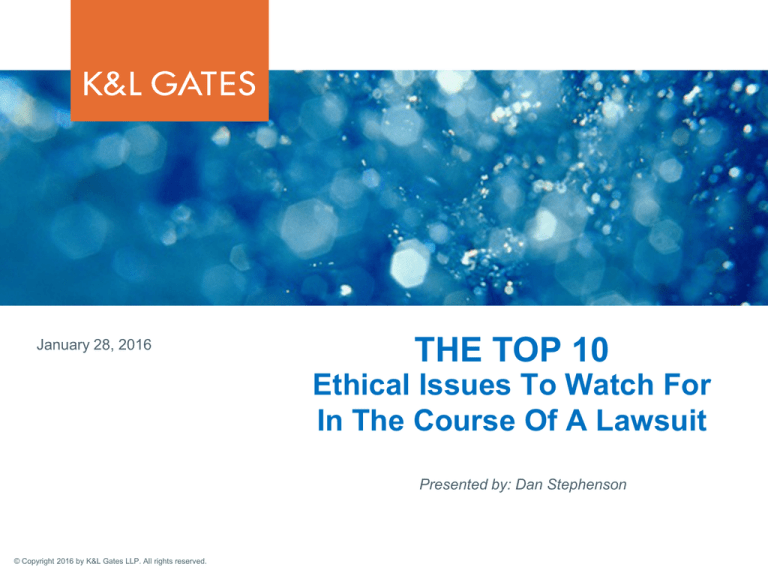
January 28, 2016
THE TOP 10
Ethical Issues To Watch For
In The Course Of A Lawsuit
Presented by: Dan Stephenson
© Copyright 2016 by K&L Gates LLP. All rights reserved.
PRESENTER
Dan Stephenson
Partner,
Photo
Here
Raleigh and Los Angeles
919.831.7053 and 310.552.5043
Resident in the Raleigh and Los Angeles offices, Dan Stephenson focuses
his practice on commercial disputes and class actions. He has experience
defending companies in the pharmaceutical, aviation, computer and
consumer product industries. He has a mechanical engineering degree,
which gives him the insight to thoroughly assess the technology aspects of
complex lawsuits. He also represents clients on matters involving
intellectual property litigation, product liability, and commercial litigation.
dan.stephenson@klgates.com
•
•
•
•
33 years’ litigation experience
Former law firm General Counsel (6 years)
Former Attorney Grievance Commission Examiner
Presenter/author on ethics topics
klgates.com
1
klgates.com
2
INTRODUCTION
• All 10 topics affect inside and outside counsel
• Growing number of claims against counsel for
litigation activities
• Research and experience: repeated teaching
and reinforcement help avoid errors in
judgment and memory lapses that lead to
claims
klgates.com
3
1. New Case Processing
• Don’t blow the deadline
Answer
Removal
Other (in some states: notice of non-party fault)
• Notify the Insurer (where applicable)
Whose responsibility is it?
Inside and outside counsel need to discuss
Don’t assume someone else is taking care of it
klgates.com
4
RECOMMENDATIONS – New Case Processing
Be aware – even with modern docketing systems, this
still happens at companies and law firms.
Get a system in place with a backup. Use a checklist.
New cases must be dealt with in a matter of a few days
at most.
klgates.com
5
2. Retention of Counsel / Unauthorized Practice
• Outside Counsel
Birbrower case and the aftermath
Birbrower: NY attys prosecuting arbitration in CA is UPL
IL Advisory Op: regular conduct of arbitrations in IL by out-ofstate counsel is UPL
Desilets: federal court rules trump state UPL rules in federal
courts
Fought, the Restatement, and New Model Rule 5.5: OK if
“reasonably related” to proceedings in the state of licensure
Associating with local counsel will usually avoid UPL problems
Can non-admitted attorney’s name be on the pleadings?
klgates.com
6
2. Retention of Counsel / Unauthorized Practice
• Inside Counsel
What if inside counsel is not licensed?
Effect on Privilege
State registration or licensure requirements
(Example): Virginia Rule of Court 1A:5. In-house
counsel must:
Get admitted to state bar, or
Get a “corporate counsel certificate”, or
“Register” if no activities are Va.-related
klgates.com
7
3. Framing of Claims and Defenses
• Candor to the Tribunal / Rule 11
Claims and defenses with merit
Not brought with an improper motive
Citing adverse case law
• Collateral Litigation
Abuse of process, malicious prosecution, tortious
interference, etc.
Bourgeoning as a strategy, though cases are rarely
successful
klgates.com
8
4. Contacts With Witnesses
• Preparing your employees
If you don’t tell them not to, they might speak to opposing
counsel or the opposing party
• Contacting your opponent’s employees and exemployees
What are the limits?
Can inside counsel do it when outside counsel can’t?
• Contacting the Plaintiff’s medical providers
klgates.com
9
5. Dealings With Experts
• Claims Based On Expert Misconduct
E.g., expert publishes info he got from you; opponent says
publication was defamatory
• “Ghost Writing” of Expert Reports
• Spoliation and Sanctions
Trigon Insurance
Destruction of drafts of ghost-written expert reports
Rule 26: all documents considered by the expert
Mock trial reports, powerpoint presentations
klgates.com
10
6. Responding to Discovery Requests
• Failing to Preserve Evidence
• Timeliness of Responses
Residential Funding: Sanction for “somewhat purposeful
sluggishness”
Inside & outside counsel both need a system
Discuss who has what responsibility
• Boilerplate Objections
Recent cases imposing sanctions
klgates.com
11
6. Responding to Discovery Requests
• Sufficiency of Searches for Responsive Documents
and Information
Increased focus on electronic discovery
Need to explain to non-lawyers e.g. “what constitutes a
‘document’” – Metropolitan Opera
• Is There a Duty to Stop Normal Document
Destruction?
Lessons from Arthur Andersen / Enron
klgates.com
12
7. Confidential Information
• Protecting Your Own Information
Restrict internal dissemination
Recent limits on protective orders
Watch for inadvertent production
2 sets of eyes if possible; Clawback provisions
• What To Do When Opponent Inadvertently Discloses
Privileged Material
• Observing Protective Order Requirements
Bankers Trust (leak of sealed document to media)
• HIPAA
klgates.com
13
8. Attorney-Client Privilege
• Basic Rule
• (1) Attorney, (2) Client, (3) Communication
• Acting as attorney?
•
Who is the client?
• Primary purpose of communication
• Confidentiality
• Common Pitfalls
• Multiple “clients”
• Mixed business and legal advice
• Overuse of “Privilege” label
klgates.com
14
8. Attorney-Client Privilege
Common Pitfalls (cont’d)
• Inadequate confidentiality precautions
• Communications involving non-control employees
•
Contractors
•
Consultants
•
Contract “employees”
• Crime-Fraud exception
klgates.com
15
8. Attorney-Client Privilege
• “[M]odern corporate counsel have become involved in all facets of
the enterprises for which they work. As a consequence, in-house
legal counsel participates in and renders decisions about business,
technical, scientific, public relations, and advertising issues, as well
as purely legal issues.”
• “Business advice, unrelated to legal advice, is not protected by the
privilege even though conveyed by an attorney to the client.”
•
In re Vioxx Prods. Liab. Litig., 501 F. Supp. 2d 789, 795 (E.D. La. 2007)
• In-house counsel – no presumption of privilege
• “Mixed” communications – privilege not likely to attach
klgates.com
16
8. Attorney-Client Privilege
•
Best Practices
•
Provide a label (“Privileged”) or descriptor (“In response to
your request for legal advice”)
•
Don’t put it on everything, every time – use judgment
•
Avoid using business title when giving legal advice
•
Give an “Upjohn warning” (I represent the corporation) when
doing interviews
•
Segregate legal and business functions, communications,
files, meetings
•
Don’t include unnecessary participants
klgates.com
17
9. Perjury and Other Misconduct
• Committed by your employees
Study the rules to see when and how to report or
correct
• Committed by your opponent
Inside and outside counsel both may have obligations
to report
There may well be a litigation consequence
(dismissal/default, adverse inference, etc.)
klgates.com
18
10. Settlements
• Restrictions on an attorney’s right to handle similar
cases in the future
ABA and most states prohibit such clauses
• Releases
Consider broad release language that precludes collateral
litigation, including claims against inside and outside counsel
Can an agreement not to report an ethical violation be part of a
settlement?
klgates.com
19
10. Settlements
• Communicating “offers” to the “client”
Opposing attorney who will not communicate an offer: what to do
An offer to participate in ADR
What is inside counsel’s duty to communicate offers in-house?
Can outside counsel instruct a client to make an offer to the
opposing party directly?
Is the “client” the insurer or the insured?
klgates.com
20
CAUTIONS
• Ethical rules vary from state to state
Consult local rules and case law
• Inside Counsel’s role is often critical to the analysis
Acting as “lawyer” or “client”?
• Get Advice – Talk About It
Ethics problems tend to get bigger as time elapses
klgates.com
21
Questions
Thank You
klgates.com
23

